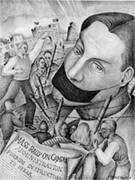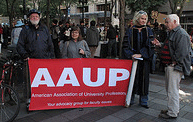The federal government of the United States is currently waging a war against democracy and a priority target are institutions of Higher Education. The legitimating narrative is that universities are bastions of “woke” ideology and that state intervention is necessary to return the university to core ethnonationalist values and traditions. Thus, the current administration pretends to depoliticize universities by doing the most political thing imaginable: by subordinating universities to direct state and, indeed, direct party control.
This is a classically Orwellian narrative, in which words are willfully severed from their frame of reference and routinely employed to mean their precise opposite. “Inclusion” means racism, “diversity” means elitism, opposition to genocide is “terrorist aligned,” and the government thought police have arrived to liberate the university from its faculty.
The ideological cover story is paper-thin, but the stakes in this battle are existential: The Trump administration’s goal is nothing less than to destroy the institution of the university as a site of open inquiry and of deliberative knowledge production. How will universities respond to this threat? What does leadership look like in the face of an extortionist state that apparently aims to make the public funding of research and teaching contingent on the political obedience of teachers and researchers to political party doctrine? All in the name of American values.
We propose four principles that we believe are critical to mounting an adequate response to this emergency. We call on the UW administration to endorse and to act on these principles.
- Universities must take control of the narrative. The anti-university narrative is powerful. None of its claims are coherent but they do not need to be coherent to be effective. The right-wing has effectively created a cutout of the university as a liberal indoctrination machine. Their aim is not the elimination of DEI programming. For the autocrats in power, the university as a whole is the diversity initiative, and they won’t be satisfied with anything less than an absolute demolition of the higher education mission.
Trying to respond to this narrative on its own terms is a losing proposition: We must generate and disseminate our own public-facing narratives about what we do, how we do it, and why it matters to all people. We must reposition the university as the champion of a way of life that people value.
At the center of our counter-narrative, we would expect to see a robust defense of academic freedom: The rationale for faculty autonomy in matters of teaching and research is that if we can only produce knowledge that pleases the people in power, we are not producing very good knowledge – and we are certainly not producing knowledge that supports a broad range of human lives and human flourishing
2. The core principle of academic freedom is that the teaching and research mission of the institution is set by its faculty, in dialogue with our students and staff. In keeping with this principle, the narrative of the university in this moment of crisis should be crafted by the faculty: by the scientists, the policy experts, and the cultural analysts who can assess the current crisis and develop a comprehensive strategy to respond. We have world experts in climate science, public health, politics, law, information, rhetoric (among a host of other relevant fields) with the capacity to define what is at stake and to reshape public views.
The counter-narrative will not be crafted by staff attorneys, budget analysts, donor relations specialists, or brand consultants. The defense of academic freedom must model academic freedom by centering faculty expertise. The current crisis thus compels institutions to build dynamic forms of shared governance, in which faculty input is not simply advisory.
3. The university must be defended as a place of thought in support of democracy and of a functioning society. What we do at universities is to teach and to practice thinking: evidence-based reasoning and analytical methods. Thinking is at the core of our collective capacity to imagine and to build the world we wish to inhabit. Universities must be inclusive institutions so that this training in critical thought is broadly and democratically accessible. The university is about equity through intellectual opportunity.
This understanding of the university has been undermined for decades by a neoliberal view of higher education as an investment, realized as professional credentials and increased earning potential. This view emerged in tandem with the defunding of public higher education and has been used to justify crisis levels of student debt. The evisceration of public higher education is at the root of the current administration’s ability to paint the university as elitist and out of touch with the concerns of ordinary Americans.
The current crisis demands that we recenter a vision of the university as a site of open inquiry and innovation in the public interest and that we press for the restoration of public higher education and expanded access to higher learning.
4. The strategy of the current administration is to begin with targeting international students and faculty for protected political speech. The police-state methods employed have been patently illegal. They are meant to terrorize and to silence – and to pave the way for their actual aim, which is the criminalization and decommissioning of entire fields of study and their practitioners. (This is plainly legible in the demand that Columbia University place Middle Eastern, South Asian, and African studies department and the Center for Palestine Studies in academic receivership.)
The university must stand in robust and public defense of all targeted faculty, students, and staff. This defense should include provision of legal services. And there can be no compromise on the university’s intellectual autonomy. Compliance will not save us. Together, we save ourselves.
Mission
The mission of the UW Chapter of the American Association of University Professors (AAUP) is to advance academic freedom and shared governance; to define fundamental professional values and standards for higher education; to promote the economic security and working conditions of all categories of faculty, academic professionals, graduate students, post-doctoral fellows, and all those engaged in teaching and research in higher education; to develop the standards and procedures that maintain quality in education; to help the higher education community organize to make our goals a reality; and to ensure higher education’s contribution to the common good. Founded in 1918, the chapter has worked with allies to shape public higher education in Washington State by opposing privatization and corporate control, promoting diversity and equity, and advocating for accessible, high-quality education.
Promoting academic freedom, shared governance and tenure

Since 1915, AAUP has been the guardian of academic freedom, shared governance, and tenure at the University of Washington and universities throughout the United States. The UW chapter was founded in 1918 and helped create the Faculty Senate and the system of tenure at UW. It also has contributed directly to the University’s reputation as a premier institution of higher education.The chapter helped create the Faculty Senate, the Faculty Code, and system of tenure (see History) and protecting and strengthening those institutions remain its core mission today. The names of AAUP members today grace some of the campus’s best known buildings. Professors Padelford, Parrington, Savery, McMahon, and Smith were all members of AAUP.
A national and campus level organization

AAUP operates on both a national and campus level, sustained by the 45,000 members whose dues insure that faculty will have a strong voice. The national office in Washington D.C. coordinates activities on many fronts. When Congress considers higher education bills, AAUP is there to lobby and advise. When state legislatures write their budgets, AAUP is there. When journalists look for data and information, AAUP is where they turn. When individual faculty are involved in employment disputes, they call AAUP, which helps resolve more than 1,000 cases each year. Most importantly, when college and university administrations do things that threaten academic freedom, undercut shared governance, or violate faculty codes, they know that AAUP will be there, ready to defend practices that the organization helped invent.
Establishing standards

Over the years AAUP committees have established standards that are recognized by most institutions of higher education. These include the 1940 Statement of Principles on Academic Freedom and Tenure, which is understood around the world as the bedrock for legal reasoning about Academic Freedom. They include policy statements about governance practices of Colleges and Universities that anchor systems of shared governance in most universities, including UW. These and other policy statements help shape best practices and foundational understandings for universities and colleges across the United States and beyond. They are compiled and published on policy page of the AAUP website and in the famous AAUP Redbook. Universities are urged to bring their practices into compliance with these standards. When violations are flagrant and the issues warrant, an offending institution can be subject to AAUP censure.
A data resource for higher education
AAUP is a communication center and data resource for higher education. The national office publishes Academe, a bi-monthly magazine, and the new publication AAUP Journal of Academic Freedom. Also critical is the Annual Report on the Economic Status of the Professionwhich policy makers, faculty and administrators rely on each year for comparative data on the salaries of faculty at universities and colleges across the country.
Promoting communication among faculty
The chapter maintains the Faculty Issues and Concerns email listserve. More than 1,300 UW faculty members and librarians rely on it for news and discussion of campus and national issues.
Other chapter activities
The chapter helps faculty who seek advice regarding disputes, grievance procedures, including adjudication.
Ongoing commitments include:
- promote discussion about collective bargaining as a resource for UW faculty
- redress gender and racial inequalities
- establishing a fair faculty salary policy and to raise salaries to a level competitive with peer institutions
- resist the further degradation of the tenure system
- expose and contest the casualization of faculty positions and the exploitation of contingent faculty.
- monitor online and distance learning initiatives
For more information click on the links and buttons above and left.
Because Academic Freedom is not free, it is important that AAUP has the members and the funds to continue its work. Please join. For membership information click here
Meetings are held each month. Members, other faculty and librarians, and invited guests are welcome.
